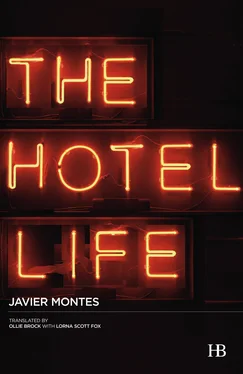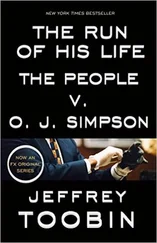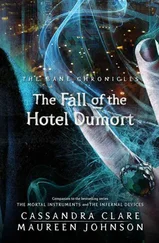Javier Montes - The Hotel Life
Здесь есть возможность читать онлайн «Javier Montes - The Hotel Life» весь текст электронной книги совершенно бесплатно (целиком полную версию без сокращений). В некоторых случаях можно слушать аудио, скачать через торрент в формате fb2 и присутствует краткое содержание. Год выпуска: 2013, Издательство: Hispabooks, Жанр: Современная проза, на английском языке. Описание произведения, (предисловие) а так же отзывы посетителей доступны на портале библиотеки ЛибКат.
- Название:The Hotel Life
- Автор:
- Издательство:Hispabooks
- Жанр:
- Год:2013
- ISBN:нет данных
- Рейтинг книги:3 / 5. Голосов: 1
-
Избранное:Добавить в избранное
- Отзывы:
-
Ваша оценка:
- 60
- 1
- 2
- 3
- 4
- 5
The Hotel Life: краткое содержание, описание и аннотация
Предлагаем к чтению аннотацию, описание, краткое содержание или предисловие (зависит от того, что написал сам автор книги «The Hotel Life»). Если вы не нашли необходимую информацию о книге — напишите в комментариях, мы постараемся отыскать её.
The Hotel Life — читать онлайн бесплатно полную книгу (весь текст) целиком
Ниже представлен текст книги, разбитый по страницам. Система сохранения места последней прочитанной страницы, позволяет с удобством читать онлайн бесплатно книгу «The Hotel Life», без необходимости каждый раз заново искать на чём Вы остановились. Поставьте закладку, и сможете в любой момент перейти на страницу, на которой закончили чтение.
Интервал:
Закладка:
A breeze began to blow, freshening the smell of paint. I felt dizzy as I straightened up from the railing, like a shipwrecked man in reverse, standing on his ghost ship; I would have liked to wave my arms and call out to the umbrellas crossing the streets below, safe on their dry land. The bellhop came over, too, eventually, and gave me a fright that could have ended badly.
“I thought there was a fire.”
We looked each other in the face for the first time. It was one of those cryptic comments that are easily decoded. I think he was regretting it even as he spoke. He was embarrassed by the sudden, involuntary intimacy that had sprung up between us, inexplicable and faintly repellent — we were sudden accomplices in who knows what. I wasn’t able to do anything other than smile and go back to the elevator. Feverish with the smell of turpentine, and the cold, and altitude sickness.
~ ~ ~
“Jesus, the lobsters I have to eat just to bring home the bacon!”
I had made a tactical withdrawal to the reading room an hour ago when the hotel bar filled with fifty-somethings, their bellies spilling over their belts. They were roaring with laughter and slapping each other on the back. The room had been a funereal sight when it was empty, but this was worse. The waiters were overwhelmed by the sudden invasion. I closed my notebook and prepared to flee. But before I could turn around, as I stood at the bar, somebody pulled a prank that hadn’t been tried on me since I was twelve: the sharp jab to the back of the right knee that makes the joint give way and the person nearly fall over if he’s caught unawares. It’s an odd sensation to lose one’s footing suddenly. Not altogether unpleasant, but at that moment, I found it annoying.
“And the caviar, and the oysters too! How you doing, neighbor?”
Sure enough, it was my neighboring columnist, the restaurant critic. When I turned around, there he was in his wheelchair, laughing. And so I don’t think the jab to the leg was, in fact, intentional; it was just the part of me most within his reach. Still, he seemed to be treating me with a greater degree of familiarity than really exists between us. Before today, I don’t think we had met more than one or two times, at the newspaper’s annual dinners. I suppose he reads me every week, as I do him, and that can, even if only very obliquely, make for a sort of fellow feeling.
I think he was a bit tipsy. Perhaps he always talks to people like that. Or perhaps he’s always tipsy. Because now I remember that he had bellowed out his lobster line at the last newspaper dinner, too, as he took his seat at the table we were sharing (or as he pulled up to it, rather). And he was overfamiliar and droll throughout the meal, and he kept calling me “neighbor.” It’s odd, because he doesn’t have the right physical appearance for the role: he jokes, but his eyes don’t joke; in fact, they rarely blink. Of course, he drops that tone when he writes. In “Table Talk”, he will often make it clear that, even as he ladles on the praise, the subjects of his reviews will still feel sick on reading them.
He explained to me that the invading army was a group of guests on a press junket at the hotel, as the owners wanted to present their new restaurant and that season’s menus. The umpteenth example of the fact that everything comes round in the end — now that I don’t go to a single one of these events, they end up coming to me. They had just come out, he said, of an immensely long post-prandial session in one of the dining rooms, with speeches, coffee, drinks, and cigars.
“They invited me because they know I’m preparing the second volume of A Hundred Menus to Try Before You Die . I imagine you’ve read the advance in the paper.”
I hadn’t, nor had I read volume one. But I do know that it’s a huge hit, that there is no contemporary household or modern couple that doesn’t have it on their shelves and follow it like the Bible, and that it must be going into its tenth edition by now. (Actually, it would be impossible not to know — they coo about it at the paper on a daily basis.) But I wasn’t about to apologize; he has never remarked on a single word in any of my reviews. In fact, I doubt he’s read any of them. As for his writing, what I like are the adjectives; I can’t be absolutely certain he’s using them ironically, but you have to admit that they’re inspired. No one writing in the Spanish language has previously dared to pronounce a prawn “playful,” or to chew on an “insolent little rump steak.”
He laughed and slapped me on the knee before giving me a chance to reply. His eyes betrayed no doubt — not for a moment did he think I’d read it.
“Naturally, I’m going to include this place.”
He used his arms to push himself up in his seat, and I found myself leaning down so that he could whisper something to me. Not exactly in my ear, but he was suddenly much closer to my height.
“Because this really was one of those menus you try just before you die.”
He sat looking at me, waiting to see my reaction. I think he was ready to explode with devilish laughter at the slightest sign of complicity from me. But he’s a quick man, and at the last moment he opted instead for stroking his small, white, Mephistophelian beard and laughing mostly to himself, shaking his shoulders more than necessary.
His goatee is pointy, but it doesn’t make his features any sharper. I found his face even fleshier than I had remembered it, marbled with every hue from saffron to eggplant. The idea with the little beard, I suppose, is to dignify his face, give him an air of some sort of Falstaff of the flame grills. But it only does half the job, just as this man is only half served by his farmhand’s figure; strong arms and big hands frame the solid belly of a bon viveur , but his thin legs and his small feet turned inward on the footrest cut the impression short. At the dinner with the paper, someone had asked him over dessert if it was difficult to visit restaurants incognito. He laughed and answered that we would be surprised how easy it is to slip under the radar in a wheelchair.
“You really think I’d be a food critic if it weren’t for the chair?”
That day he really did guffaw, and every one of us at the table chimed in with him. In fact, I remember all of us feeling awkward and laughing nonstop all evening.
“You’re also here for work, I take it.”
His eyes grew steely again and belied the large smile that was forming a few inches below.
“Or is it for pleasure?”
It’s not just his body, I thought; on his face, too, there are two halves that don’t add up. You might even say they contradict or cancel each other out. At that moment, it seemed as though none of his jokes were innocent. Now I think it’s more that he finds the very idea of innocence the best joke of them all.
Perhaps it’s all a question of physiognomy — faces can be so disorienting. There are people who carry their features around as though they had won them in a raffle, people who gesticulate at random and never quite understand what their own gestures mean.
But I’m reminded again that we hardly know each other; perhaps he was just looking at me like that to build up the nonexistent sense of ease between us that he considers it so imperative to affect.
“Well, our work is a pleasure, isn’t it?”
It wasn’t much of a comeback on my part, but he celebrated it with the burst of laughter he had been holding in from before, and which again seemed inappropriate. Or all too appropriate, if what he was really laughing at was my attempt to dodge his real question with some arthritic old joke.
Now that I’m writing this, it seems absurd to have given so much thought to a formulaic conversation. But this man has a knack, when you’re face to face with him, for making you think you’re hiding something. Or even for making you remember that that’s exactly what you’re doing. If we ever did talk about these things (which we never will), perhaps we would agree on that. Almost everybody is hiding something, and we ought to feel especially suspicious of anyone who is convinced of not hiding a thing.
Читать дальшеИнтервал:
Закладка:
Похожие книги на «The Hotel Life»
Представляем Вашему вниманию похожие книги на «The Hotel Life» списком для выбора. Мы отобрали схожую по названию и смыслу литературу в надежде предоставить читателям больше вариантов отыскать новые, интересные, ещё непрочитанные произведения.
Обсуждение, отзывы о книге «The Hotel Life» и просто собственные мнения читателей. Оставьте ваши комментарии, напишите, что Вы думаете о произведении, его смысле или главных героях. Укажите что конкретно понравилось, а что нет, и почему Вы так считаете.












